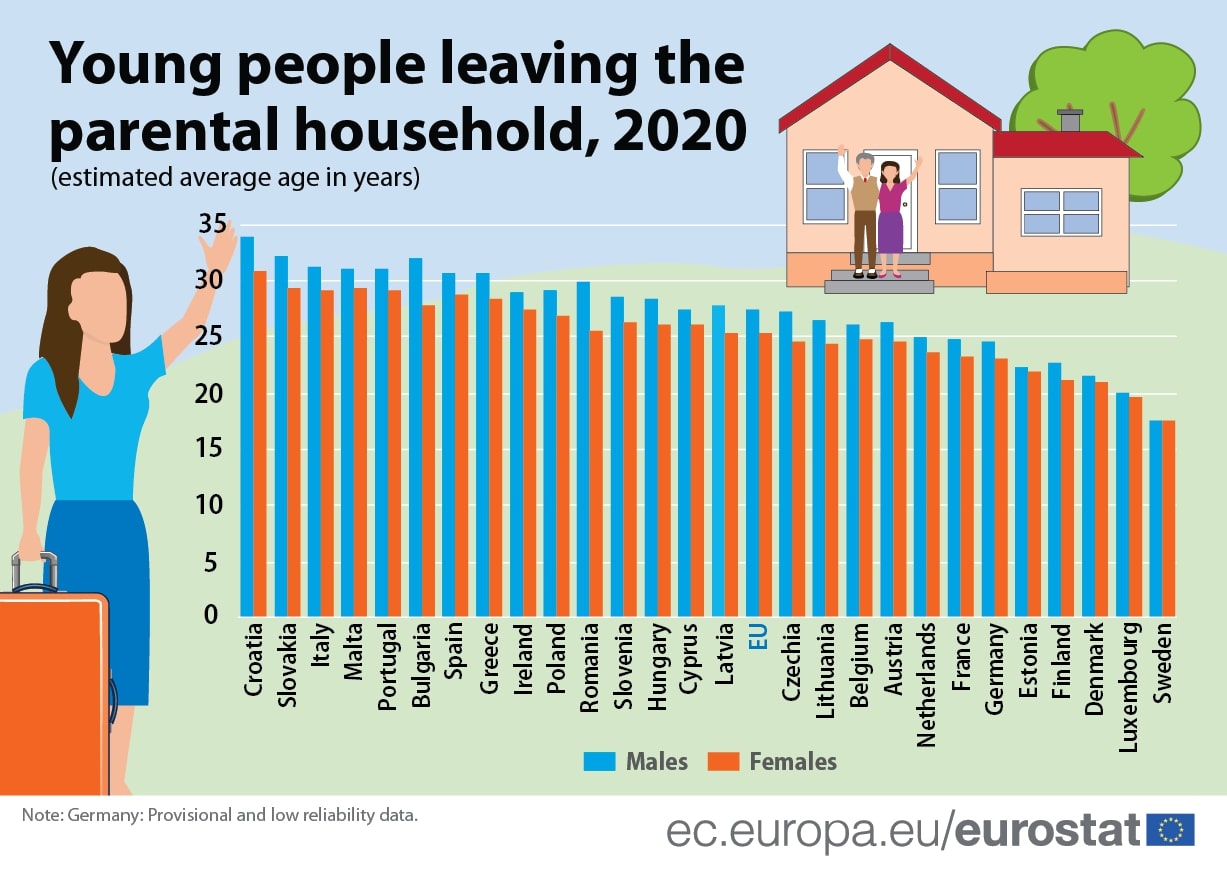Thessaloniki gets ready for its metro launch in November
The underground rapid transit lines have been under construction for almost two decades due to various project delays
 TheMayor.EU logo
TheMayor.EU logo It also confirmed trends that men are more reluctant to fly away from the parental nest
On 12 August, Eurostat released its annual report on the state of the economic and social emancipation of young people on the continent. In other words, it gives us a general idea at what age they decide to leave their parental home and become truly independent adults. In 2020, the average age of taking that step for EU youngsters was 26.4 years.
This year’s report was interesting because it gave us the first look at how the coronavirus pandemic has affected the maturing process of young Europeans. The numbers show that the average age of emancipation has increased, meaning that children were reluctant to venture out into the world while COVID was raging.
The report also confirmed trends that have been observed in the past decades, which showed that everywhere young women are braver when it comes to spreading their wings than their male counterparts. There are regional differences in this gender gap, however, and they seem to be closely linked to economic factors, although many would argue that culture and tradition play their prominent role, too.
In most northern and western countries, young people left the parental home on average in their early to mid-twenties, while in southern and eastern countries the average age was in the late twenties or early thirties.
The oldest average ages, all at 30 years or higher, were recorded in Croatia (32.4), Slovakia (30.9), Malta and Italy (both 30.2) and Portugal (30.0 years). By contrast, Denmark (21.2 years), Luxembourg (19.8) and Sweden (17.5) recorded the lowest average ages, all under 22 years old.

A graph showing that European men like staying home longer than European women.
Source: Eurostat
What’s more, the countries where children lingered longer at home also showed that it was a phenomenon that applied more to men than to women – with wider gender gaps in that respect. This immediately might conjure up knowing smirks about ‘Mediterranean momma’s boys’ in some people’s minds.
However, these gaps are the widest in the poorest countries of the EU, all of which are also located on the Balkan Peninsula. In Romania, young males left at 30.0, and females at 25.5 years (4.5 years gender gap), followed by Bulgaria (4.2 gender gap) with males moving out at 32.0, and females at 27.8 years. In Croatia, both young men and women moved out the latest in the EU (at the age of 34.0 and 30.9 years, respectively).
Setting aside cultural factors, this shows that labour market conditions and opportunities for personal development may have a more decisive role to play in such decisions.
Researchers have pointed out that if we also take into account neighbouring non-EU countries, such as North Macedonia, Serbia and Turkey, we will see that there is a strong interplay between NEET rates and the emancipation age. NEET, to clarify, is the now-common acronym for young people who are neither employed nor studying.

The underground rapid transit lines have been under construction for almost two decades due to various project delays

Now you can get your wine in Talence by paying directly in Bitcoin

That’s because the state has to spend money on updating the railway infrastructure rather than subsidizing the cost of the popular pass

Rethinking renewable energy sources for the urban landscape

The examples, compiled by Beyond Fossil Fuels, can inform and inspire communities and entrepreneurs that still feel trepidation at the prospect of energy transition

Now you can get your wine in Talence by paying directly in Bitcoin

The 10th European Conference on Sustainable Cities and Towns (ESCT) sets the stage for stronger cooperation between the EU, national and local level to fast track Europe's transition to climate neutrality.

At least, that’s the promise made by the mayor of Paris, Anne Hidalgo

The underground rapid transit lines have been under construction for almost two decades due to various project delays

At least, that’s the promise made by the mayor of Paris, Anne Hidalgo

Hostal de Pinós is located in the geographical centre of the autonomous region

Despite its church-y name, the district has long been known as the hangout spot for the artsy crowds

Urban dwellers across the EU are having a say in making their surroundings friendlier to people and the environment.

Forests in the EU can help green the European construction industry and bolster a continent-wide push for architectural improvements.

Apply by 10 November and do your part for the transformation of European public spaces

An interview with the Mayor of a Polish city that seeks to reinvent itself

An interview with the newly elected ICLEI President and Mayor of Malmö

A conversation with the Mayor of Lisbon about the spirit and dimensions of innovation present in the Portuguese capital














